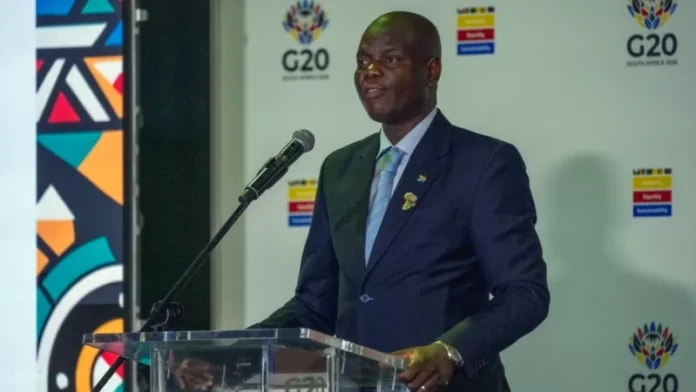The city of Johannesburg recently played host to the two-day Group of 20 foreign ministers meeting, which concluded on Friday. The meeting, which was aimed at addressing global issues, highlighted the current fault lines in the ever-changing geopolitical climate.
Foreign dignitaries were warmly welcomed by the host and current G20 president, South Africa. However, even before the event began, tensions were apparent. The United States Secretary of State, Marco Rubio, announced his decision to boycott the meeting earlier this month, citing the “anti-Americanism” on the agenda. These topics included discussions on climate change and equality for developing nations.
In his opening speech, South African President Cyril Ramaphosa acknowledged the discord and emphasized the need for unity in the face of rising intolerance and wars. He stated, “Yet there is a lack of consensus among major powers, including the G20, on how to respond to these issues of global significance.”
The tension was also reflected in the last-minute cancellation of a planned group photo, with no official explanation given. Steven Gruzd, an analyst at the South African Institute of International Affairs, spoke about the challenges faced by South Africa in bringing together countries that are ideologically far apart. He said, “South Africa has had a very difficult job of getting countries that are ideologically very far apart around the same table.”
South Africa has been facing criticism from the new U.S. administration, which has accused the government of land grabs. This allegation has been strongly denied by South Africa. In fact, President Donald Trump recently cut financial assistance to the country over these allegations. In Rubio’s absence, the U.S. Embassy sent Charge d’Affaires Dana Brown to represent the country at the meeting. However, the embassy declined VOA’s request for an interview.
Despite these challenges, South Africa received support from several European foreign ministers for its G20 presidency. Russia and China also sent their top envoys to the meeting. Chinese Foreign Minister Wang Yi expressed his support for South Africa’s presidency and acknowledged the current international landscape, which he described as being marked by transformation and turbulence. He assured that China would work with all parties towards world peace, security, and multilateralism.
The ongoing conflict in Ukraine was a major topic of discussion at the meeting, especially following President Trump’s recent comments. The U.S. president shocked the world by suggesting that Ukraine was to blame for Russia’s 2014 invasion and going as far as labeling Ukrainian President Volodymyr Zelenskyy as a “dictator.” Retired U.S. diplomat Brooks Spector commented on this, saying, “Now that President Trump has effectively ended the general Western consensus on Ukraine, it’s obviously fallen to the European nations to be the primary source of support for Ukraine and its president in its struggle against Russia.”
In the wake of Trump’s comments, the European Union has stepped up to support Zelenskyy and the country in their fight against Russia. French Foreign Minister Jean-Noel Barrot, who was present at the meeting, expressed his concerns and said, “A capitulation of Ukraine today would set a terrible example for every country in the world that would be under the threat of predation by its bigger neighbor. Is this the world in which we want to live?”
However, despite these challenges and differences of opinions, South African Foreign Minister Ronald Lamola put a positive spin on things in his closing remarks. He stated that the meeting had been an overall success and that delegates had engaged in productive talks.
The G20 foreign ministers meeting in Johannesburg may have highlighted the fault lines in the current geopolitical climate, but it also showcased the importance of open dialogue and collaboration in addressing global challenges. Despite differences in ideologies and opinions, it is crucial for countries to come together and work towards a more peaceful and prosperous world. South Africa, as the host of this meeting, has shown great leadership in bringing together countries from all corners of the world and promoting meaningful discussions. Let us hope that this meeting will serve as a stepping stone towards greater unity and cooperation among the G20 nations.

